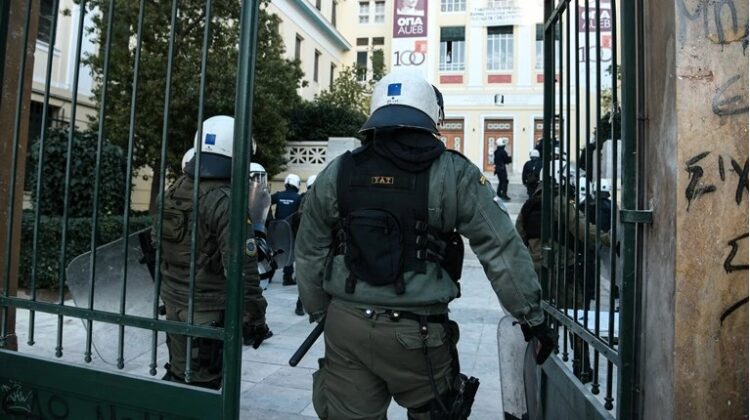Ξεχωριστή σημασία έχει το “χαστούκι” στο μέτρο της πανεπιστημιακής αστυνομίας που επιβάλλει η ελληνική κυβέρνηση από τους Ευρωπαίους Φιλελευθέρους.
Με τον πιο δυναμικό τρόπο απαντούν οι Ευρωπαίοι Φιλελεύθεροι στην αυταρχική (και … αστυνομική) αντιμετώπιση των πανεπιστημίων από την ελληνική κυβέρνηση.
Στη ετήσια συνδιάσκεψη του LYMEC, που έλαβε χώρα στο Παρίσι το προηγούμενο Σαββατοκύριακο (22-24 Οκτωβρίου), εγκρίθηκε ομόφωνα ψήφισμα για την ελληνική περίπτωση, με το οποίο η θέσπιση πανεπιστημιακής αστυνομίας καταδικάζεται ως πράξη «κατά των ανθρωπίνων και πολιτικών δικαιωμάτων και της ελευθερίας της έκφρασης».
«Η παρουσία της αστυνομίας στα πανεπιστήμια», λέει το ψήφισμα, «δύναται μόνο να πολώσει την ατμόσφαιρα και να προκαλέσει περισσότερη αστυνομική βία», η οποία «συναντάται σε κάθε μέρος της κοινωνικής ζωής στην περιοχή». Εδώ, το κείμενο του ψηφίσματος εντάσσει την ελληνική περίπτωση στο ευρύτερο πλαίσιο της νοτιοανατολικής Ευρώπης, όπου ως γνωστόν υπάρχουν τα προβλήματα αυταρχισμού με περιπτώσεις τύπου Όρμπαν στην Ουγγαρία και Μοραβιέτσκι στην Πολωνία. «Το παράδειγμα της Ουγγαρίας, της Πολωνίας και της Τουρκίας, συγκρίνεται πλέον με της Ελλάδας», αναφέρεται.
Καλεί δε την ελληνική κυβέρνηση να πάρει πίσω το σχετικό νομοθέτημα και εγείρει τα υπόλοιπα ευρωπαϊκά κράτη να αντιληφθούν τις συνέπειες που έχει μια τέτοια κρατική παρέμβαση για τη δημοκρατία γενικά.
Αναφορικά με τα προβλήματα παραβατικότητας στα πανεπιστήμια, οι Φιλελεύθεροι προτείνουν λύσεις που στηρίζουν το αυτοδιοίκητο του πανεπιστημίου, την ίδια στιγμή που επισημαίνουν με νόημα ότι οι αρχές θα πρέπει να διερευνήσουν με μεγαλύτερη αφοσίωση την πραγματική αιτία των όποιων προβλημάτων. Στο ίδιο «ψήφισμα-καταπέλτη» διαπιστώνεται το παράδοξο ότι η ΝΔ, το «συντηρητικό κόμμα» όπως χαρακτηριστικά γράφεται, διατηρεί τη δική της φοιτητική νεολαία (ΔΑΠ), η οποία λειτουργεί «ως μηχανισμός προπαγάνδας για την προσέλκυση μελών», με αντάλλαγμα «προνόμια» που αφορούν στα θέματα των εξετάσεων και όχι μόνο.
Διευκρινιστικά, το LYMEC είναι η νεολαία του ευρωπαϊκού φιλελεύθερου κομματος ALDE, το οποίο αποτελεί την 3η μεγαλύτερη ομάδα του Ευρωπαϊκού Κοινοβουλίου. Η συνδιάσκεψη αποτελεί το σημαντικότερο όργανο των φιλελεύθερων και συγκεντρώνει το σύνολο των πολιτικών οργανώσεων της Ευρώπης. Την ελληνική αντιπροσωπεία αποτελούν οι Ελεύθεροι Νέοι, η φιλελεύθερη πολιτική νεολαία η οποία διατηρεί την ανεξαρτησία της από πολιτικά κόμματα.
Το πλήρες κείμενο του ψηφίσματος (στα αγγλικά)
Movers:
Young Liberals Greece, Liberalno Demokratska Mladina (LiDeM), JNC, LHG, USR Tineret, Joves Liberals d’Andorra, Youth Forum of Naša stranka, Liberal Democratic League of Ukraine (LDLU), Lithuanian Liberal Youth, Forum mladih Nasa stranka, Momentum TizenX, Nova Stranka Youth, Nowoczesna Youth
Considering that:
Human Rights in Southeast Europe face severe challenges. Several governments have chosen illiberal and authoritarian policies, targeting certain social groups, such as women and the LGBTQ+ community or/and principles like freedom of expression. Nonetheless, the area of Southeast Europe is in a critical position concerning conservative policies and violations of human rights. The conservative governments of Hungary, Poland, Turkey and Greece promote more and more conservative policies, with limitations and restrictions for their population.
The pandemic and lockdown were used by these governments to promote unpopular laws, having in mind that people do not have many options to resist or oppose to them. COVID-19 and the respective lockdown policies provided a great “social space” for many governments to expand their power over society. The examples of Poland, Hungary and Turkey are now accompanied by Greece, and its conservative government.
Noting that:
During the past years, Greek universities have turned into dangerous spaces for students to study, due to high crime rates and lack of proper security. Over the years, unsolicited squatting, vandalism, and stealing took place inside universities. Moreover, a significant number of acts of violence have also been recorded, mainly involving politically motivated acts of violence, either among students, or violence and harassment against professors and members of the university’s administration.
University education in Greece faces challenges related to underfunding, political interventions (especially from the neoconservative party), and institutional deficit. Nevertheless, the University remained a land of freedom of expression.
Last year, the conservative Greek Government passed a new law, namely combating illegal actions on campus they established a new Campus Police at the expense of university research funds.
These few days of its function, Campus Police have clashed with students and faculty in the Aristotle University of Thessaloniki.
The research and operational funds of Greek universities are significantly low, (4.3% of the GDP, lower than the EU average 4.9%) in comparison with other EU countries, and the government is their sole financier.
Campus Police intervention is anyway acceptable in Greek university campuses when illegal incidents take place, in order to combat with unlawful actions. In principle, the police were always allowed to intervene -on campus- if illegal activities take place provided they are called by the University authorities.
Recognizing that:
Universities are places where students can openly and freely exchange ideas, discuss and focus on how we can improve our lives and our societies.
The use of Covid-19 restrictions should be an instrument that helps reduce
contagion risks for the population and not a tool for governments to use for control of the population or against political opposition. The presence of police forces in the universities polarises the environment and increases the incidents of violence and brutality.
Over the previous year, Greek Government tried to stationed police forces inside the campus and with full authority to exert violence, but took the law back.
Police brutality is apparent in every part of social life in our region; the police have been hitting civilians, families and individuals, in squares and streets because, as it was displayed on the news, they were identified as “anarchists”.
Police suppression is used by the neoconservative Governments through the region of Southeastern Europe as a panacea for every problem.
That the law in question offers no new solution to the deeper education problems of Greece.
The conservative party in Greece runs its own student youth organization on campus as a propaganda group, recruiting new members in exchange for the exams topics and other benefits. Now, they will be operating under the full
protection of the police.
LYMEC calls for:
The condemnation of government policies that act against human and civil rights, such as the freedom of research, the freedom of speech and the freedom of the Press.
The condemnation of violence and practices against freedom of speech and expression within university campuses.
The Greek state to repeal the law and all EU Member States to recognize the
repercussions of what similar legislations can have.
The withdrawal of police forces from universities and their substitution with
security staff, employed by and accountable to the Administration of the University.
The guarantee of research and opinion freedom in all European Universities. The students are expected to share their opinions freely and openly exchange ideas without fear of punishment by the government.
The reallocation of the funds to fill the gaps and the deficiencies of the universities towards the research and new scientific personnel.
Reshaping and reforming the legal framework, in order to clearly define the
cases that police can enter into the campus (needed to follow the general legal procedures and justify their actions).
In exceptional situations of conflicts, the limiting of the access on university campuses only to students having student cards and authorized guests and personnel, in order to reduce insecurity and prevent illegal acts.









